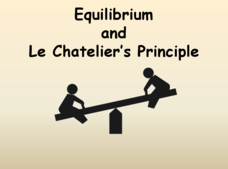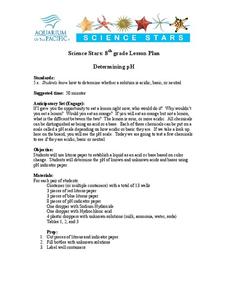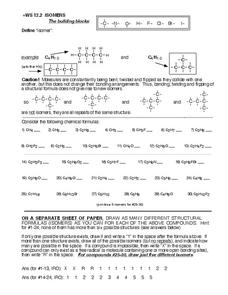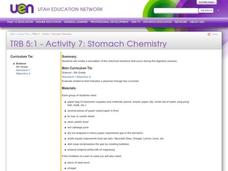Curated OER
Mixing Colors
Fifth graders perform experiments with color mixing and color changing. They observe the differences between physical and chemical changes and record their observations in journals.
Curated OER
Chapter 3 Worksheet Matter
In this matter worksheet, students answer ten questions about matter including the phase of matter, mixtures and how they are different from compounds, the physical and chemical properties of matter and the difference between homogeneous...
Curated OER
Household Chemistry
Young scholars use indicator paper to determine if substances are acidic, basic, or neutral. They test for Ph levels in them. They investigate the effect of oxygen on darkening fruit cut and exposed to the air. They observe vitamin C as...
Science Geek
Equilibrium and Le Chatelier's Principle
Time to shake up the status quo with a presentation that describes Le Chatlier's Principle and has pupils examine situations in which equilibrium is upset. Four examples show different stresses to the reaction and the resulting shift.
Curated OER
Water Cycle
Ninth graders explore ways water moves through various reservoirs on Earth, examine how human activities change water cycle, investigate substances present in water that indicate human activity, and discuss how understanding water cycle...
Curated OER
Energy from Hydrocarbons
In this energy from hydrocarbons worksheet, students read about endothermic and exothermic reactions and how hydrocarbons release heat as fuels. Students read how to measure heat changes in reactions and practice finding the specific...
Curated OER
Determining pH
Eighth graders explain the difference between acids, bases and neutral solutions. In this chemistry lesson, 8th graders describe the properties of each. They determine the pH of an unknown solution using the indicator paper and pH scale.
Curated OER
Thermodynamics
Young scholars investigate energy involved for bonds to form and break. In this thermodynamics lesson plan, students experiment with chemical reactions to observe endothermic and exothermic reactions, they explore entropy and the effects...
Curated OER
Oobleck, Goop, and Glurch
Sixth graders use teacher prepared samples of substances. They perform the same observations and complete charts for each substance. After recording and analyzing their results, 6th graders make changes in the recipes to create a better...
Curated OER
WS 9.3 Le Chatelier's Principle
In this Le Chatelier's Principle worksheet, students are given three chemical reactions along with various disturbances on the systems. They must indicate the effects of each disturbance on the concentrations of products and reactants in...
Curated OER
Isomers
In this isomers worksheet, students define isomers and then draw the different isomers for the given chemical formulas. This worksheet has 30 problems to solve.
Curated OER
REDOX Lab
Students produce copper metal by electrolysis. In this REDOX lesson plan, students use a copper (II) chloride solution and a 9 volt battery to produce copper metal through an electrolysis reaction. Students make observations and take...
Virginia Department of Education
Acids and Bases
What did one titration say to the other titration? We should meet at the end point! Young chemists perform four experiments: dilute solution, neutralization, titration, and figuring pH/pOH.
Virginia Department of Education
Metamorphic Rocks
Rocks can bend? Pupils investigate how heat and pressure produce metamorphic rocks by modeling them using clay, and then categorize samples based on observable characteristics. The instructional activity ends with a metamorphic rock...
Curated OER
Earth's Water
If the majority of our planet is covered with water, why do we need to bother conserving it? With a thorough and varied investigation into the location and types of water on the earth, learners will gain an understanding of why this...
Utah LessonPlans
Stomach Chemistry
Students will create a simulation of the chemical reactions that occur during the digestive process. A physical change occurs when the appearance of matter changes, but the composition of the matter does not change.
Curated OER
Measuring pH
Students perform an experiment which will illustrate how to measure the approximate pH of chemicals in water using a pH indicator. They understand that a pH indicator is a chemical that changes color when it comes in contact with acids...
Curated OER
Activity #19 Oxygen For Yeast
Students observe and record what occurs when yeast is added to hydrogen peroxide. They indicate why a chemical reaction (decompostion) must have occurred during the experiement. Pupils explain why yeast was used. Students comprehend the...
Curated OER
Amylase Enzyme In Saliva
Students test for amaylase enzyme in a variety of substances. Student pairs perform a series of tests to determine how long it takes the starch sample to change to sugar molecules and the blue color to disappear when various saliva...
Curated OER
A Limnology Study of Drainage Ditches
Students chemically test water, observe microscopic organisms in the classroom, and screen the sample for macroinvertebrates. They design a reporting sheet that list all the items to be tested and a space to record the results.
Curated OER
It's in the Bag!
Eighth graders measure temperature changes and make drawings of the interactions between matter and energy. By measuring the temperature students can conclude if there are changes in levels of energy.
.
Curated OER
Where in the World is Carbon Dixoide?
Students conduct experiments designed to detect the presence of CO2 by using a BTB that changes color (blue to yellow) in the presence of CO2. First, students experiment with the CO2 from combining vinegar and baking soda. In part two,...
Curated OER
Introduction to Neutraliization
Students explore acids and bases and the process of neutralization.T hey practice volume measurements and observe the neutralization of an acid
directly through bubble formation and indirectly through indicator color changes.
Curated OER
How much Carbon Dioxide is in My Seltzer Water?
Students discover the law of conservation of mass though experimentation. In this chemistry lesson, students experiment with acid - base indicators to determine the presence of carbon dioxide. Students complete the labs with analysis...

























